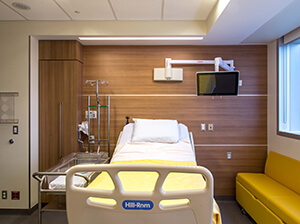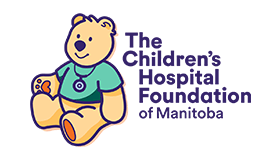Mother & Baby Care

The Mother Baby care team looks after women who require admission following spontaneous vaginal delivery, cesarean section, or perinatal loss.
Our team will provide care to both the patient for postpartum complications such as bleeding, or wound infections, and to the infant (routine baby care, infant feeding, monitoring, testing).
Did you know?
Spending the first hour after birth skin-to-skin with your baby helps him or her stay warmer, calmer and breastfeed better than babies who are swaddled or wrapped. Holding your baby skin-to-skin in the days and weeks after birth helps him or her grow and increases your milk supply.
For more tips like this and information on how to care for a newborn, visit our Health Information page.
COVID-19 resources
- COVID-19 infections and pregnancy – English | French
- COVID-19 vaccine: information for pregnant and breast feeding individuals – English | French
Postpartum care
- Routine maternal assessments: After delivery, our care team will check your vital signs, do a “tummy” check for uterine tone, bleeding, look at your perineal (bottom) stitches or c-section incision, and ask you about breastfeeding comfort
- Bring a support person: We recommend you have one (1) support person present to assist you as your baby will be with you at all times, unless they require medical support or observation in the Neonatal Intensive Care Unit (NICU)
- Estimated discharge: The anticipated length of stay for spontaneous vaginal deliveries is up to 24-36 hours, and about 24-72 hours for C-section births. You should arrange transportation/accommodation ahead of time
Newborn care
- At birth
- Routine assessments: Our care team will assess your baby at birth and every hour for the first few hours of life. Our teams do this using the Apgar score, a scoring system that assesses your newborn baby’s well-being using five different factors: heart rate, breathing, muscle tone, reflexes, and skin colour
- Eye care: Eye prophylaxis is routinely discussed with parents due to risk associated with gonorrhea and chlamydia infection during birth. These sexually transmitted infections can cause blindness in newborns. Our care team may recommend your baby receive antibiotics to prevent this.
- Vitamin K to prevent hemorrhagic disease: Vitamin K is routinely recommended and administered to newborns within 6 hours of birth to prevent hemorrhagic disease (HDN). It is recommended that newborns receive one dose at birth, which is given intramuscularly to your baby’s upper thigh muscle. For more information, see guidelines for vitamin K prophylaxis in newborns.
- During your stay:
- Jaundice screening: Jaundice is a yellow discoloration to a newborn’s skin and the white part of the eyes. It is a sign that there’s too much bilirubin in the blood. Jaundice usually appears in the first five days of life. Your baby will be checked within 72 hours after birth using a transcutaneous bilirubinometer device to measure your baby’s bilirubin level. It usually gets better or goes away on its own within a week or two without causing problems. In rare cases, if the bilirubin level stays high and isn’t treated, it can cause brain damage called kernicterus. This can lead to serious lifelong problems. A blood test may be drawn to further assess the level of jaundice your baby is experiencing.
- Congenital cardiac defects screening: All newborns are routinely screened for heart defects. Our care team will routinely listen to baby’s heart for murmurs. After your baby is 24-hours-old, your nurse will perform an oxygen saturation test, where an oxygen saturation probe will be attached to your baby’s hand and foot to assess that your baby has passed this screening.
- Newborn hearing screening: This service is available for all infants born in Manitoba, or newborns who arrive in Manitoba in early infancy (less than six months of age). Our care team will perform a hearing screening on each of your baby’s ears. This screening is fast and safe. Soft sounds are played by a computer into your baby’s ears using a soft ear tip. The computer measures the response to the sound from your baby’s ears, to find out if your baby has normal hearing. Many babies sleep during the screening. You can breastfeed or hold them while it’s going on. The screening works best when your baby is quiet and sleeping.
- If your baby does not pass, your baby will have a second hearing screening. This will take place either before you leave the hospital or in the community shortly after. For more information, see the provincial brochures.
- Metabolic screening: All babies in Manitoba are offered a routine blood test which assesses for numerous metabolic disorders. For more information about this screening, see newborn screening in Manitoba.
- Going home
- Approved infant car seat: Review the Manitoba Public Insurance’s child car seats guidelines for instructions and appropriate use prior to coming to the hospital. Bring your infant car seat with you into the hospital before discharge so staff can review basic safety points with your family. If you do not have a car seat, let your care team know.
- Going home outfit: Bring clothes in different sizes to make sure they fit. Baby sleepers, blanket, diapers, hats, socks
- Birth registration: If your baby is born in the hospital, complete the Registration of Birth in Manitoba form located in the Registration of Birth Package distributed by your care team. Review to ensure your baby’s birth registration form is completed correctly and in full, and then return the form to our staff before you go home with your newborn. For more information, visit Manitoba Vital Statistics Agency.
We support informed decision-making
Let us know if you would like to learn more about:
- Infant feeding: Our goal is to ensure women and families feel empowered to make informed decisions about how they plan to feed their newborns.
- Breastfeeding: For more information about breastfeeding and its benefits, visit our Health Information page.
- Formula: You may also feed formula for medical or personal reasons, exclusively or as a supplement. Review this resource to help you prepare, feed and store formula safely
- Hand expression of breast milk: There are many benefits of knowing how to express milk from the breast without the use of expensive pumps. For more information, view the hand expressing milk video.
- Skin-to-skin care: Kangaroo care/skin-to-skin contact is holding and cuddling your undressed baby on your bare chest, skin-to-skin. We encourage skin-to-skin care at birth and for at least the first 1 hour of life or until the baby has completed their first breastfeed. Skin-to-skin care reduces pain during painful procedures, regulates your baby’s temperature, heart rate, and respiratory rate, and promotes bonding.
- Support for families of an NICU baby: On Level 2 of HSC Winnipeg Women’s Hospital, you’ll find the multi-acuity, neonatal intensive care unit, also known as NICU. In this unit, our specialized teams care for the sickest newborns of the province. For more information, see the NICU page.
Safety and security
The mother baby unit is secure and locked. Your visitors will need to request access to the unit using the intercom.
- Staff wear HSC ID: Feel free to ask your care team to show you their employee ID, who they are and their role. If your baby must be taken for tests or procedures outside of your room, staff members will identify themselves and will be wearing an HSC employee ID badge.
- Newborn ID bands: You, your baby, and your support person will have matching ID bands. This baby-tagging system offers hospital-wide protection by continually monitoring the location of each baby in every part of the hospital through the Infant Protection System. Staff will check that these bands and ID numbers match at every transition in your care throughout our hospital, during shift changes, and at discharge.
- Walk safely: Your baby must be placed in a bassinette if you are walking in the hallways outside of your room to prevent falls.



